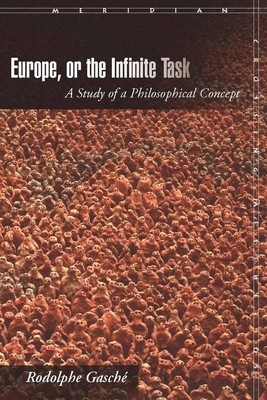
- We will send in 10–14 business days.
- Author: Rodolphe Gasché
- Publisher: Stanford University Press
- ISBN-10: 0804760608
- ISBN-13: 9780804760607
- Format: 15.5 x 22.6 x 3.1 cm, kieti viršeliai
- Language: English
- SAVE -10% with code: EXTRA
Reviews
Description
What exactly does Europe mean for philosophy today? Putting aside both Eurocentrism and anti-Eurocentrism, Gasché returns to the old name Europe to examine it as a concept or idea in the work of four philosophers from the phenomenological tradition: Husserl, Heidegger, Patočka, and Derrida. Beginning with Husserl, the idea of Europe became central to such issues as rationality, universality, openness to the other, and responsibility. Europe, or The Infinite Task tracks the changes these issues have undergone in phenomenology in order to investigate Europe's continuing potential for critical and enlightened resistance in a world that is progressively becoming dominated by the mono-perspectivism of global market economics. Rather than giving up on the idea of Europe as an anachronism, Gasché aims to show that it still has philosophical legs.
EXTRA 10 % discount with code: EXTRA
The promotion ends in 22d.06:41:37
The discount code is valid when purchasing from 10 €. Discounts do not stack.
- Author: Rodolphe Gasché
- Publisher: Stanford University Press
- ISBN-10: 0804760608
- ISBN-13: 9780804760607
- Format: 15.5 x 22.6 x 3.1 cm, kieti viršeliai
- Language: English English
What exactly does Europe mean for philosophy today? Putting aside both Eurocentrism and anti-Eurocentrism, Gasché returns to the old name Europe to examine it as a concept or idea in the work of four philosophers from the phenomenological tradition: Husserl, Heidegger, Patočka, and Derrida. Beginning with Husserl, the idea of Europe became central to such issues as rationality, universality, openness to the other, and responsibility. Europe, or The Infinite Task tracks the changes these issues have undergone in phenomenology in order to investigate Europe's continuing potential for critical and enlightened resistance in a world that is progressively becoming dominated by the mono-perspectivism of global market economics. Rather than giving up on the idea of Europe as an anachronism, Gasché aims to show that it still has philosophical legs.


Reviews